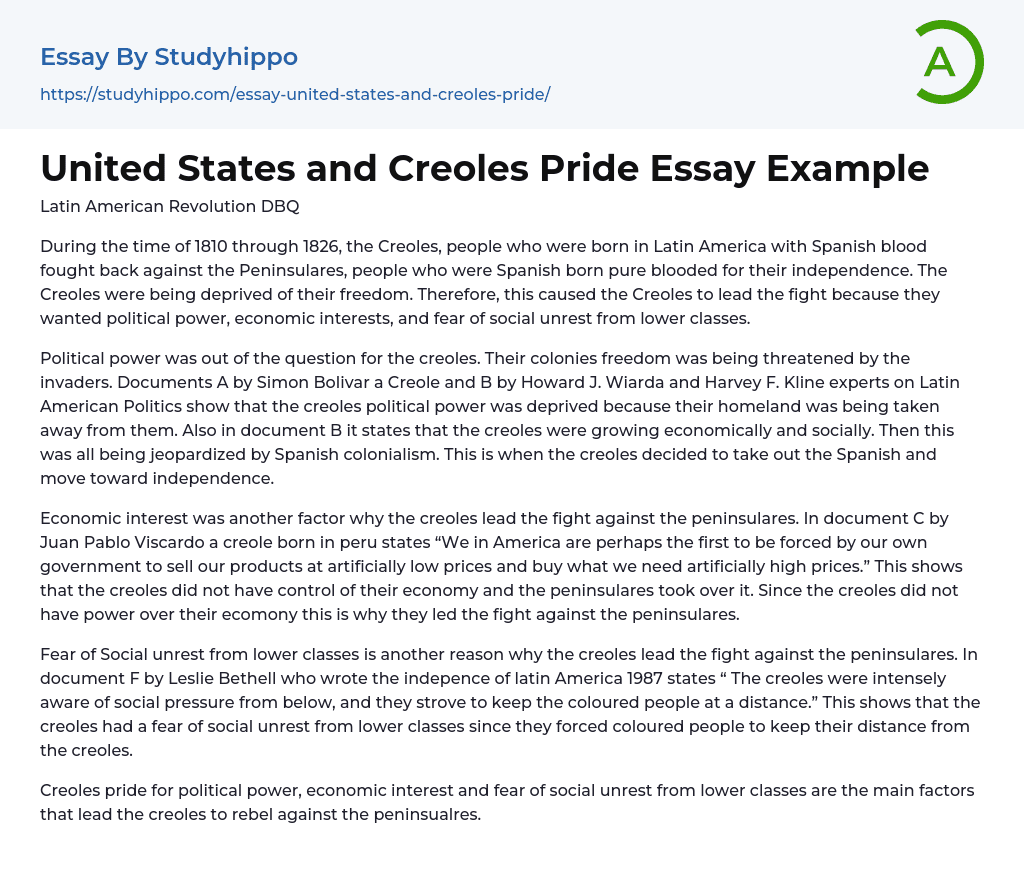The subject matter of the DBQ is the Latin American Revolution.
Between 1810 and 1826, the Creoles - Latin Americans of Spanish ancestry - rose up against the Peninsulares, who were pure-blood Spaniards, in their fight for independence. The denial of freedom acted as a trigger for the Creoles' leadership in this battle, driven by their desire for political power, economic interests, and concerns about potential social unrest among the lower classes.
The creoles were unable to attain political power due to the threat posed by the invaders, which endangered their colonies' freedom. Simon Bolivar, a creole, and Howard J. Wiarda and Harvey F. Kline, experts on Latin American Politics, in documents A and B respectively, highlight how the creoles' political power was taken away as their homeland was being seized. Document B also reveals that the creoles
...were progressing economically and socially, but Spanish colonialism put all of this at risk. As a result, the creoles decided to remove the Spanish and strive for independence.
The creoles' economic interest played a significant role in their leadership of the fight against the peninsulares. Document C, written by Juan Pablo Viscardo, a creole from Peru, reveals that the creoles were compelled by their own government to sell their products at artificially low prices and purchase necessary items at artificially high prices. This indicates that the creoles lacked control over their economy, which was dominated by the peninsulares. Consequently, this lack of economic power prompted the creoles to spearhead the resistance against the peninsulares.
The creoles' fear of social unrest from the lower classes is a reason why they led the fight against
the peninsulares. In document F by Leslie Bethell, who wrote "The Independence of Latin America" in 1987, it is stated that "The creoles were intensely aware of social pressure from below, and they strove to keep the coloured people at a distance." This suggests that the creoles enforced the separation of coloured people from themselves due to their fear of social unrest.
The creoles rebelled against the peninsulares due to a combination of factors including their political power, economic interest, and fear of social unrest from the lower classes.
- Alaska essays
- Boston essays
- Brazil essays
- California essays
- Canada essays
- Chicago essays
- Costa Rica essays
- Florida essays
- Hawaii essays
- Latin America essays
- Los Angeles essays
- Mexico essays
- Slavery In America essays
- Usa essays
- Virginia essays
- Washington essays
- John Locke essays
- 9/11 essays
- A Good Teacher essays
- A Healthy Diet essays
- A Modest Proposal essays
- A&P essays
- Academic Achievement essays
- Achievement essays
- Achieving goals essays
- Admission essays
- Advantages And Disadvantages Of Internet essays
- Alcoholic drinks essays
- Ammonia essays
- Analytical essays
- Ancient Olympic Games essays
- APA essays
- Arabian Peninsula essays
- Argument essays
- Argumentative essays
- Art essays
- Atlantic Ocean essays
- Auto-ethnography essays
- Autobiography essays
- Ballad essays
- Batman essays
- Binge Eating essays
- Black Power Movement essays
- Blogger essays
- Body Mass Index essays
- Book I Want a Wife essays
- Boycott essays
- Breastfeeding essays
- Bulimia Nervosa essays
- Business essays




